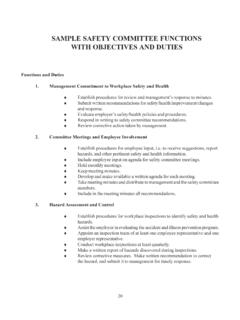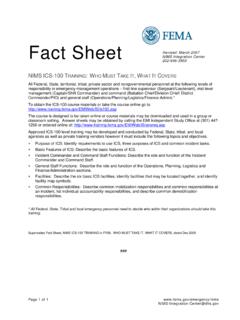Transcription of SYLLABUS Financial Accounting REVISED
1 Financial Accounting by Michael P. Licata, Course SYLLABUS and Learning objectives by Chapter Basic Course Description Financial Accounting by Michael P. Licata, is a first Accounting course for homeschool high school students. Many traditional high schools offer an Accounting course as an elective for students interested in pursuing a career in business. Now homeschool high school students have such an elective available to them. This course is a challenging college level course in Financial Accounting similar in content to the first Accounting course taken by all students in university and college schools of business across the country. Any high school level student with basic math skills can handle this course.
2 Course objectives The objective of Financial Accounting by Michael P. Licata, is to introduce students to the study of Accounting which is known as the language of business. The main purpose of Financial Accounting is to measure and report the performance of a business to interested parties both outside and inside of the business. These interested parties use Accounting information to make a variety of decisions such as: Investors - Deciding whether to purchase or sell a company s stock. Bankers - Deciding whether to lend money to a business. Managers Making day-to-day business decisions such as whether to increase inventory levels, or to spend more on advertising, or to pay dividends to stockholders.
3 Students taking Financial Accounting by Michael P. Licata, will learn to prepare and interpret the four basic Financial statements which all publicly traded companies must prepare and make available to the public. These statements are the income statement, balance sheet, statement of owners equity and statement of cash flows. See below for detailed Learning objectives by Chapter. Any homeschool high school student interested in a career in business or in someday owning their own business will benefit from this course. Prerequisites None. Any high school level student with basic math skills (algebra) can handle this course. Course Materials The course has 12 Chapters each divided into 2 or 3 parts.
4 Basic materials for each chapter: (1) Flash lectures 2 or 3 parts, each part 15 to 40 slides (2) Lecture slides to print (the lecture slides from (1) above in a printer friendly format). (3) Key Terms and Concepts (1 3 pages) (4) Chapter Problems (4 15 problems per chapter). Note: some of the Chapter Problems are worked in the Flash lectures as demonstration problems while some are assigned as homework problems to be completed by the student. (5) Solutions to Chapter Problems noted in (4) above. Grading Exams: Exam 1 on Chapters 1 points Exam 2 on Chapters 5 points Exam 3 on Chapters 9 points CLEP Style Quizzes/Comprehensive Final points Grading Scale: A92% -100%A-90% - +87% - - - +77% - - - - 60% 1 There are 11 quizzes (one quiz for each of chapters 2 through 12).
5 There is no quiz for chapter 1, the introductory chapter. Each quiz is valued at 14 points (7 multiple choice questions per quiz * 2 points per question). These quizzes are similar in content and format to the questions on the CLEP Financial Accounting Exam. Students can take each chapter s quiz after completing that chapter or they can take all 11 quizzes together at the end of the course as a comprehensive CLEP style final exam. The total points for the quizzes are 11 quizzes * 14 points per quiz = 154 points. Method of Instruction This course is taught in a non-traditional format. There is no textbook and no 40 page chapters to read. All necessary course content is included in the Flash lecture slides and a brief Key Concepts and Terms file for each chapter.
6 The Flash lecture slides for each chapter include a description and discussion of all important concepts and demonstration problems which include step by step illustrations of how to work through the various types of Accounting problems covered. Students learn Financial Accounting in four simple steps: 1. Watch the Flash lectures for a chapter which include important concepts and demonstration problems. 2. Work the assigned homework problems. 3. Compare the homework problems worked to the solutions file. 4. Take the exams. See the Financial Accounting Lesson Plan for more details. The course is comprised 12 chapters which are covered in 28 lessons (including exams).
7 Students can work through the course in the following formats: (1) A traditional college semester format (September through December or January through May) working two lessons per week for 14 weeks. (2) An entire academic year format (September through May) working one lesson per week for 28 weeks. (3) A summer school format (June through July) working three lesson per week for 9 weeks. Note: The average time per lesson is 75 minutes to view the Flash lecture plus to hours to work the homework problems. About Professor Licata Michael P. Licata, is currently an Associate Professor in the Department of Accountancy in the Villanova School of Business2 at Villanova University in Villanova, Pennsylvania.
8 Professor Licata has taught the Financial Accounting course dozens of times in his 24 plus years as a Professor at Villanova University. He has also taught the Financial Accounting course for 4 years (as a graduate student) at Northeastern University, Texas A & M University, and Harvard University. The past eight years Professor Licata has specialized in teaching 100% distance learning courses at both the graduate and undergraduate levels. Throughout his career students have consistently rated Professor Licata among the best teachers in his department and in his college at Villanova University according to the Course and Teacher Surveys (CATS) at Villanova University.
9 2 The Villanova School of Business has been rated the #11, #13, #12, and #19 best undergraduate business school in 2009, 2008, 2007, and 2006, respectively by Business Week Magazine. Financial Accounting by Michael P. Licata, Learning objectives by Chapter Chapter 1 (Introduction to Accounting ) Part 1 Learning objectives : Define what is a business and the three types of businesses. Discuss the purpose of Accounting , who uses it, and the importance of the study of Accounting . Illustrate basic Accounting transactions and Financial statements for a small retail business. Part 2 Learning objectives : Distinguish Financial Accounting v.
10 Managerial Accounting . Discuss the need for integrity in the field of Accounting . Define and discuss GAAP (the rules of Accounting ). Define the roles of the FASB and the SEC. Discuss the Accounting profession, career opportunities in Accounting and the requirements to become a CPA (Certified Public Accountant). Chapter 2 (The Financial Statements) Part 1 Learning objectives : Discuss the need for Financial statements. Define the four basic Financial statements: income statement, balance sheet, statement of cash flows, and statement of stockholders equity. Define the basic Accounting equation and demonstrate how it is affected by individual transactions.







